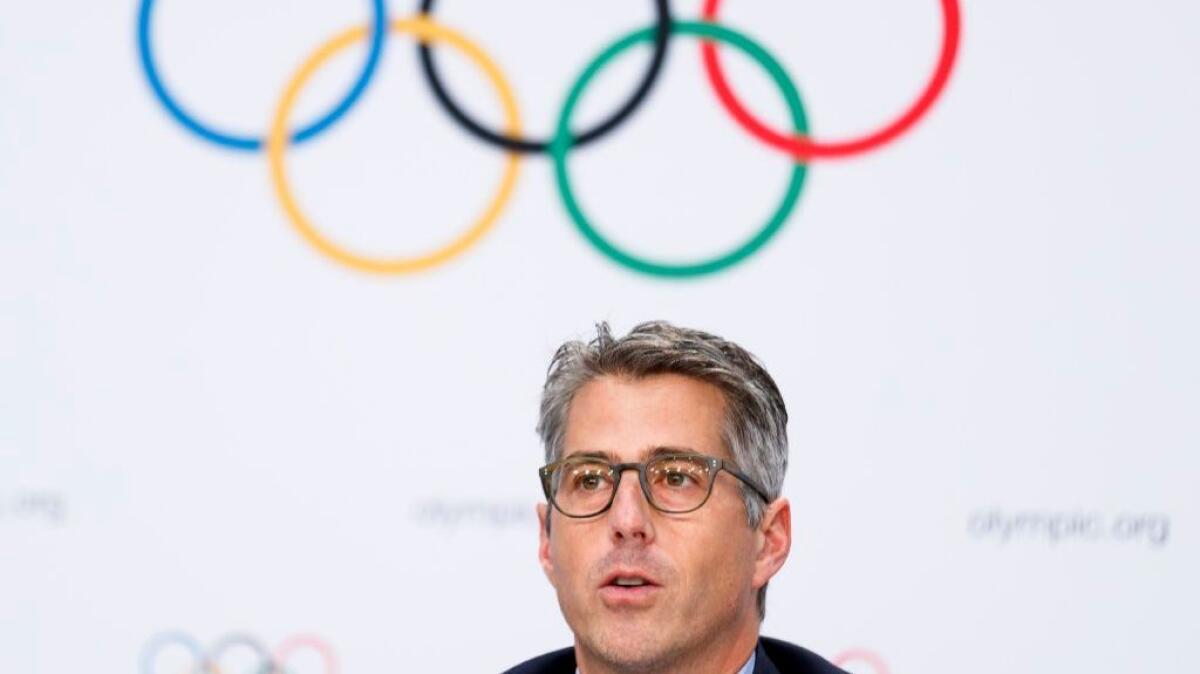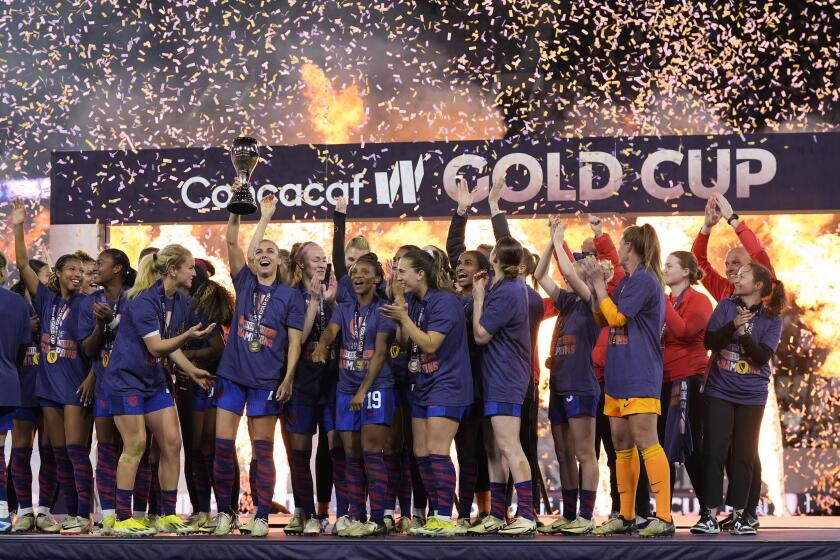Commentary: Olympic process should be on L.A.’s timeline, not the IOC’s, to determine if the deal is good

On Friday, the Los Angeles City Council is expected to greenlight an agreement to host the 2028 Olympics. This follows a back room deal that L.A. Angeles Olympic bidders reached with the International Olympic Committee that hands Paris the 2024 Games while LA will settle for 2028. The L.A. bid team’s negotiations led to unusual concessions from the IOC, leading Mayor Eric Garcetti to say, “This deal was too good to pass up.”
But how great is this deal with the IOC, really?
L.A. boosters have been touting it as massive and historic, but a closer look at the deal shows it’s not all that special. There are significant uncertainties. Olympic honchos want the agreement totally done by Aug. 18. But the City Council need not rush to placate people in high places. It should be doubly sure that the Olympics are serving everyday people of Los Angeles and that the city is not simply servicing the whims of the Games brokers. If the praise the IOC has heaped on the L.A. bid is sincere, the group should show flexibility and make an exception to its timetable in this exceptional moment.
In announcing the deal, the IOC said it would contribute $1.8 billion to the L.A. Organizing Committee. This is a slice of the IOC’s broadcasting and sponsorship pie. Depending on the addition of another high-end sponsor, this number could jump to around $2 billion. This sounds like a lot of money, but organizers of the Rio 2016 Olympics received $1.5 billion from the IOC. Using a modest inflation rate of 2% would project Rio’s $1.5 billion to be worth $1.9 billion for L.A. in 2028. In short, the IOC’s supposed magnanimity might not even keep up with inflation. So, in real dollars, L.A. could actually receive less than Rio did.
The host city contract stipulates that LA 2028 organizers can use up to $160 million of that $1.8 billion payment to develop youth “sport-oriented activities” in Los Angeles before the Games come to town. It’s difficult to argue with providing sports opportunities for potentially underprivileged young people. But we don’t know who will benefit from these funds. Will the city funnel the money to those who need it most? Will these funds go to people in Compton and Watts or Coldwater Canyon and Beverly Park?
If L.A. organizers come up short on money and are forced to dip into the $500-million fiscal backstop set up by state and city officials, then essentially the sports programs become backdoor-funded by taxpayers. In short, this could end up being not a special gift from the Olympics but rather a public policy laundered through the Games.
The Olympic chorus sings with a decidedly upper-class accent. The IOC’s willingness to dole out to L.A. bidders a five-year $180-million interest-free loan to help cover organizing committee costs is a stark reminder of this reality. The IOC will also waive some $50 million in fees and charges. But the L.A. bid is privately financed, so this is little more than a multimillion-dollar gift to the rich individuals who are driving this bid. It is the one-percenters in Los Angeles who have the most to gain from this over-hyped concession, not everyday Angelenos.
Another questionable concession is the IOC’s promise to forgo its customary 20% cut of any Olympic surplus. The recent history of the Olympics does not generate optimism that there will even be a surplus. One Oxford University study found that since 1960 every single every installation of the Games with reliable data has gone over budget by an average of 156%. However, this will be the first Games where all the venues have already been built, which the organizers say will mitigate the cost overruns.
Even the $5.3-billion price tag that L.A. bidders affix to the Games deserves our healthy skepticism. Some consider it “a bargain” yet it does not include security costs, which will likely catapult well over $2 billion. L.A. organizers are banking on the federal government picking up the security tab. This is a plausible assumption but an assumption nonetheless. Sure, the L.A. Olympics may be less costly than recent Games, but that doesn’t automatically make them more just.
Thomas Bach, the president of the IOC, says that he had not given any concessions to Los Angeles. A closer look shows that Bach is closer to the truth than L.A. Olympic boosters who proclaim the deal as the best ever.
But the IOC could show a great deal more flexibility than it’s letting on. IOC higher-ups have lavished praise on the Los Angeles bid so the IOC should bend over backward to help. The IOC amended its charter in the wake of the Salt Lake City bribery scandal and more recently to explicitly forbidding discrimination based on “sexual orientation,” so one would think it could muster the parliamentary chops to accommodate Los Angeles. In fact, just last month the IOC waived an element of its charter in order to satisfy the “tripartite agreement” between L.A., Paris, and the IOC. This is more Roberts Rules than rocket science.
If the City Council approves the revamped plan, it will be rubber-stamped by the IOC at its mid-September meetings in Lima, Peru. Because of this impending IOC deadline, the L.A. bid team has pressed ahead on the IOC’s wholly manufactured timeline. This has created a rushed process based on the demands of the IOC, not the political rhythms of Los Angeles or California, including those who are clamoring to slow down the process so the public has a fresh chance to weigh in.
Los Angeles bidders are allowing the IOC to run roughshod over them. A dose of willpower is in order as well as a recognition of their true negotiating power with the IOC. L.A. need not rush.
There are many reasons to slow down and think hard before plunging ahead. Why not wait to see what the accounting firm KPMG has to say in their Olympic budget analysis? Why not hold more public forums so people can offer their input? Why not carve out more time to squeeze meaningful concessions from the IOC?
The Times editorial board correctly noted that “the window for negotiations hasn’t fully closed.” It added, “In the run-up to the ’84 Games, public concern about the potential for a taxpayer bailout led voters to approve a ballot measure that threatened to withdraw L.A. as host unless the IOC reduced the city’s risk. That’s what led the IOC to waive the requirement that L.A. shoulder all unanticipated costs.”
This hints at a public referendum on hosting the 2028 Games, an idea Angelenos should have a chance to discuss at their own pace and in their own time, not according to the whims and dictates of a group of Swiss-based sports barons with their own agenda.
Jules Boykoff is a frequent contributor to The Times. He teaches political science at Pacific University and is the author of three books on the Olympics, most recently “Power Games: A Political History of the Olympics.”
More to Read
Go beyond the scoreboard
Get the latest on L.A.'s teams in the daily Sports Report newsletter.
You may occasionally receive promotional content from the Los Angeles Times.






